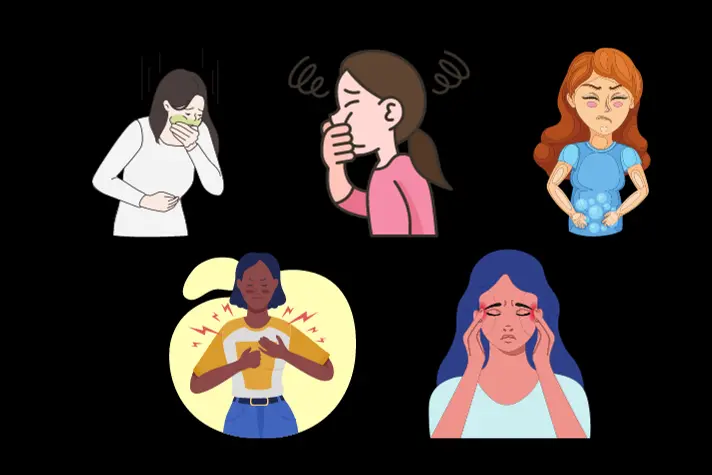
Ever felt a bit off after eating certain foods, but you’re not quite sure why?
You might be dealing with food sensitivity. It’s more common than you think and differs from food allergies in some key ways.
This post dives deep into the world of food sensitivities, revealing the common signs and symptoms that impact individuals. We’ll also explore how it can impact your mental health and everyday life – even if the symptoms seem minor at first glance.
By understanding these crucial aspects of food sensitivity better, we can navigate our way toward healthier living choices together.
Understanding Food Sensitivity
If you’ve ever experienced digestive discomfort after eating certain foods, you might be dealing with food sensitivity. But what exactly is this condition?
Food sensitivity, or food intolerance, occurs when your body is unable to properly digest certain foods. It’s not the same as a food allergy – while allergies involve an immune response and can cause severe reactions, sensitivities result in milder symptoms that often show up hours or even days later.
This delay makes it hard to pinpoint which foods are causing problems without professional help like YorkTest’s services.
The Prevalence of Food Sensitivity
You’re not alone if you think you may have food sensitivities. They’re surprisingly common. According to estimates from the American Academy of Allergy Asthma & Immunology (AAAAI), around 6% of us deal with a food allergy, and the number of food sensitivity cases is nearly double.
Research indicates these conditions could stem from factors such as enzyme deficiencies and irritable bowel syndrome (IBS) conditions, where the body lacks specific enzymes needed to break down certain types of food; irritation from natural chemicals found in some foods; or even psychological responses.
Sensitivity vs Allergy: Spotting The Difference

A key difference between allergies and sensitivities lies in how our bodies react. With an allergy, your immune system gets involved – producing antibodies against harmless substances it mistakenly identifies as threats. This process leads to immediate allergic reactions such as hives or swelling.
On the other hand, food sensitivity symptoms often take longer to appear and are generally less severe. They can include bloating, headaches, IBS flare-ups, or even mood changes. Unlike allergies, sensitivities don’t involve an immune response but rather stem from your digestive system’s inability to process certain foods.
Certain food sensitivity test kits can help you identify problematic foods that may be triggering these signs and symptoms.
The Mystery of Food Sensitivity
Because the reactions caused by food sensitivity aren’t immediate like those of allergies, they can be trickier to identify without help. People may not comprehend that their unease could be related to what they’re consuming, due to the difficulty in linking delayed reactions with particular edibles. This happens because it’s hard for them to connect delayed responses with specific foods.
Recognizing the Signs of Food Sensitivity

If you often feel bloated, gassy, or fatigued after meals, food sensitivity might be the culprit. Unlike allergies that cause an immediate immune response, food sensitivities trigger a slower and more subtle reaction.
Food sensitivity symptoms, according to Harvard Health Publishing, can appear up to 48 hours after eating and include:
- Stomach pain or cramps
- Bloating and gas
- Nausea or vomiting
- Heartburn or acid reflux
- Migraines or headaches
Digestive Disturbances
Your gut reacts first in case of food sensitivities. Uncomfortable digestive symptoms like bloating are your body’s way of signaling something is not right with what you ate. These signs could point towards a possible intolerance for certain foods such as dairy products.
Frequent diarrhea can also indicate your body’s struggle with specific foods it finds hard to break down. Keep track of how often these episodes occur post-meals as they may offer clues about potential triggers behind them.
Skin Issues
In some cases, skin issues like eczema flare-ups can hint at underlying food intolerances too. If you notice any changes in your skin condition after consuming particular items consistently, it might suggest that those ingredients don’t agree with your system.
While not as common, hives and rashes can also be signs of food sensitivity. These are usually more linked with allergies but it’s worth noting any skin changes after eating.
Mood Changes
Food and eating behaviors impact your body’s chemistry. Consuming foods that are high in omega-3 fatty acids, such as fish and nuts, may help to improve your mood while processed foods with a lot of sugar and fat can have negative impacts on mental health. So, pay attention to what you’re eating—it might be affecting your mental health more than you realize.
Final Takeaway
Recognizing signs of food sensitivity is the first step toward healthier living. This knowledge allows you to understand your body’s reactions and respond appropriately.
The impact on mental health shouldn’t be underestimated either; understanding the link between food sensitivity and conditions like anxiety or depression can make a world of difference in management strategies.
About The Author:
Tyler Tafelsky is an endurance athlete and blogger at BetterTriathlete.com. In addition to writing about sports like cycling, running, and triathlon, Tyler also competes in ultra-distance cycling races at the professional level.




